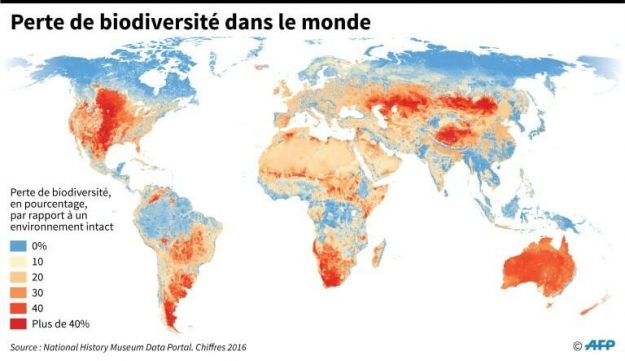Up to One Million Species may be at Risk of Extinction

Eight million animal and plant species are present on the planet. But the use of land and resources by humans threatens them, according to a UN report
Man depends on nature but destroys it methodically. Up to one million animal and plant species may be at risk of extinction,many of them “in the coming decades,” according to a draft UN report on biodiversity, obtained by AFP.
As disturbing as climate change
Drinking water, CO2-absorbing forests, pollinating insects needed for crops, fish … The Intergovernmental Science and Policy Platform on Biodiversity and Ecosystem Services (IPBES) will meet from April 29 to May 4 in Paris to adopt the first global assessment ecosystems for nearly 15 years. The state of play of biodiversity should be as worrying as the predictions of climate change.
The 1,800-page report, on which 150 experts from 50 countries have been working for the last 3 years, will be accompanied by a “summary for decision-makers” to be discussed line by line and adopted by the 130 IPBES member countries, along the lines of Giec reports on the climate.
Les chercheurs de l’@IPBES, la plate-forme scientifique mondiale sur la biodiversité, sont attendus du 29 avril au 6 mai à Paris. Ils remettront un rapport crucial sur l’état des espèces et des écosystèmes, avant le grand rdv onusien de 2020 en Chine. https://t.co/IvfD81QWdA
— ONU Environnement (@ONUEnvironmt) April 19, 2019
Eight million species on Earth
According to the draft summary obtained by the AFP – the most recent, dated January -, various “independent evidence points to an imminent rapid acceleration of the extinction rate of species (…) even if the factors (of this extinction) are not do not step up.
Of the estimated 8 million species (including 5.5 million species of insects) on the planet, “half a million to one million species are expected to be threatened with extinction, many of them in the coming decades” continues the text. The wording may change depending on what governments decide to put forward, but not the scientific conclusions.
These projections correspond to the warnings of many scientists who believe that the Earth is at the beginning of the 6th “mass extinction”, the first attributed to humans who have already removed at least 680 species of vertebrates for 500 years.
A direct impact on humans
The report is partly based on the analysis of well-studied species, including vertebrates, but highlights the “uncertainties” about many less known ones, especially insects.
The disappearance of this biodiversity has a direct impact on humans. Food, energy, medicines: “The contributions people make from nature are fundamental to the existence and richness of human life on Earth, and most of them are not totally replaceable,” warns text. For example, more than 2 billion people depend on wood for energy, 4 billion use natural medicine and 75% of crops need to be pollinated by insects.
Agriculture, fishing …
Those responsible for this gloomy situation are land use (agriculture, logging, mining) and the direct use of resources (fishing, hunting).
Then come climate change, pollution and invasive species, whose impact is “relatively less important to date”, but “accelerates”.
But the text also highlights the links between this loss of biodiversity and climate change, sometimes encouraged by the same factors, especially the agricultural model in an increasingly populous world.
Si nous n’agissons pas maintenant, c’est 50 % de la faune qui pourrait disparaître d’ici 2100 à cause du dérèglement du #climat. Voici ce que nous faisons pour l’éviter ▶️ https://t.co/PlsnqUFLiA
— Banque mondiale (@Banquemondiale) April 23, 2019
“We have to recognize that climate change and the loss of nature are just as important, not only for the environment, but for economic and development issues,” the head of IPBES Robert told AFP recently. Watson, calling for a “transformation” of food and energy production.
“Change trajectory in the next 10 years”
“If we want a sustainable planet that provides services to communities around the world, we need to change course in the next 10 years, as we have to do for the climate,” said Rebecca Shaw, Chief Scientist for WWF.
The report also estimates that three-quarters of the land surface, 40% of the marine environment and half of the watercourses have been “severely altered”.
And the most affected regions are those where indigenous peoples are particularly dependent on nature or poor populations already more vulnerable to the impacts of climate change.

Enjoyed this? Get the week’s top France stories
One email every Sunday. Unsubscribe anytime.


